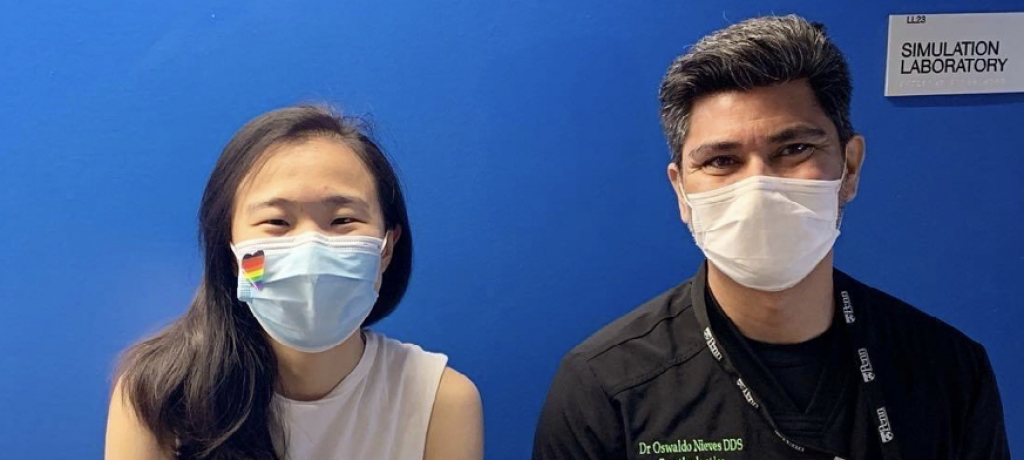Information Library
Start Reading

The lesbian, gay, bisexual, transgender, and queer (LGBTQ) population has long dealt with disparities in health care. In fact, according to a panel discussion sponsored by the Harvard T.H. Chan School of Public Health regarding LGBTQ challenges in health care, one-sixth of LGBTQ adults have experienced discrimination in a health care setting. Additionally, one-fifth have avoided medical care out of fear of discrimination.
To better serve patients who identify as LGBTQ, dentists—now more than ever—must take action to help better understand and serve the specific and unique needs of the LGBTQ community. This means ensuring LGBTQ patients receive accessible, quality dental care and services. Penn Dental Medicine is committed to furthering progress in educating the current and next generation of dental specialists on creating positive change in these areas and others.
To help showcase how Penn is meeting the needs of LGBTQ dental patients, we sat down with Dr. Oswaldo Nieves, instructor for the Division of Restorative Dentistry for Penn Dental Medicine. Dr. Nieves highlights Penn’s ongoing efforts to further education in the unique needs of LGBTQ dental patients. He also shares how his own experience has helped him provide valuable insight into propelling advocacy and eliminating health disparities within the LGBTQ community.
 One of the biggest hurdles to serving the dental needs of the LGBTQ community, according to Dr. Nieves, has been a lack of awareness.
One of the biggest hurdles to serving the dental needs of the LGBTQ community, according to Dr. Nieves, has been a lack of awareness.
“The main [challenge] is probably lack of information and knowledge,” Dr. Nieves says. “I guess we can thank the climate of the country in the past few years, and the pandemic, for really raising all these issues that we thought were being dealt with, and they weren’t. And now we’re finally aware and awake and we’re doing something to work towards that.”
While organizations like the Health Professionals Advancing LGBTQ Equality (GLMA) are helping to raise more knowledge of the disparities in LGBTQ health care, there is still adversity. For example, according to Dr. Nieves, dental schools historically haven’t focused on delving into disparities in dental treatment for LGBTQ patients. Yet, societal changes like an increase in the transgender population have made the need for specialized dental treatment approaches all the more important.
“There are so many transgender treatments that are foreign to most practitioners,” Dr. Nieves says, “just because they’re brand new. Now we’re working in an inclusive and diverse community that is asking us to be better, and to use the right pronouns and not assume who someone is as a person.”
 To help both educate and implement a more inclusive environment, Penn has established a Committee for Cultural Growth. In addition to educating the PDM community about appropriate language usage, the committee also instructs students on the importance of not assuming a patient’s gender.
To help both educate and implement a more inclusive environment, Penn has established a Committee for Cultural Growth. In addition to educating the PDM community about appropriate language usage, the committee also instructs students on the importance of not assuming a patient’s gender.
According to Dr. Nieves, there is no requirement to be part of the LGBTQ community to provide compassionate and quality dental care. One does not need to be an LGBTQ dentist but rather approach patient care from a place of compassion and understanding.
“I think what our community or our society doesn’t understand is that you don’t need to be a member [of a community] to work with a community,” Dr. Nieves says. “You just need to be an ally and be respectful. And, have the curiosity to learn from this culture and embrace it and welcome it.”
Allies are crucial to overcoming disparities in LGBTQ health care. But so is perpetuating compassion and understanding among the next generation of dentists.
“We’re working hard,” Dr. Nieves says. “We have to admit that this would not have been possible without the University of Pennsylvania always supporting our students who want to create student associations.”
To ensure the legacy of LGBTQ awareness goes on, student-led clubs, faculty advisors and
organizations are committed to carrying the torch, educating, and supporting the next generations of dental specialists.
 “Ultimately, I would say that it’s a team effort here at PDM,” Dr. Nieves says. “We cannot simply pinpoint one aspect of our community. I think that our students are pushing us to be better and change the way we educate the next generations. We have an administration that supports what we need to do, and they are making sure that we’re getting this change. And, we have the alumni, they’re supporting us.”
“Ultimately, I would say that it’s a team effort here at PDM,” Dr. Nieves says. “We cannot simply pinpoint one aspect of our community. I think that our students are pushing us to be better and change the way we educate the next generations. We have an administration that supports what we need to do, and they are making sure that we’re getting this change. And, we have the alumni, they’re supporting us.”
In fact, recently PDM received a generous $50,000 donation to go toward the LGBTQ+ Fund to identify LGBTQ+ based biases in the dental profession and ways to eliminate them.
With the continued efforts of Dr. Nieves, students, administration, alumni, and the PDM team, the LGBTQ community has a safe and welcoming place to receive high-quality, comprehensive, and compassionate dental care.
To schedule a dental visit, please call our PDM office at 215-898-8965 for any questions you may have.